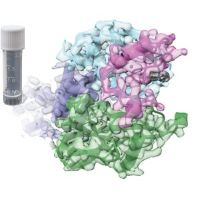Specification
| Description | Recombinant protein from the full-length sequence of Homo sapiens SWI/SNF related, matrix associated, actin dependent regulator of chromatin subfamily c member 2 (SMARCC2), transcript variant 2 (NM_139067). |
| Organism | Homo sapiens (Human) |
| Expression Host | Human Cells |
| Tag Info | His or DYKDDDDK. Please contact us if you need further information or require specific designed tag. |
| Purity | Greater than 90% by SDS-PAGE gel |
| Uniprot ID | Q8TAQ2 |
| Entry Name | SMRC2_HUMAN |
| Gene Names | SMARCC2 BAF170 |
| Alternative Gene Names | BAF170 |
| Alternative Protein Names | SWI/SNF complex subunit SMARCC2 (BRG1-associated factor 170) (BAF170) (SWI/SNF complex 170 kDa subunit) (SWI/SNF-related matrix-associated actin-dependent regulator of chromatin subfamily C member 2) |
| Application | Antigens, Western, ELISA and other in vitro binding or in vivo functional assays, and protein-protein interaction studies; For research & development use only! |
| Buffer | Purified protein formulated in a sterile solution of PBS buffer, pH7.2, without any preservatives |
| Endotoxin | Endotoxin level is < 0.1 ng/µg of protein (<1EU /µg) |
| Length | 1214 |
| Molecular Weight(Da) | 132879 |
| Protein Sequence | (The sequence of expressed protein may have some variation from the sequence shown below. Please contact us for the exact sequence.) MAVRKKDGGPNVKYYEAADTVTQFDNVRLWLGKNYKKYIQAEPPTNKSLSSLVVQLLQFQEEVFGKHVSNAPLTKLPIKCFLDFKAGGSLCHILAAAYKFKSDQGWRRYDFQNPSRMDRNVEMFMTIEKSLVQNNCLSRPNIFLCPEIEPKLLGKLKDIIKRHQGTVTEDKNNASHVVYPVPGNLEEEEWVRPVMKRDKQVLLHWGYYPDSYDTWIPASEIEASVEDAPTPEKPRKVHAKWILDTDTFNEWMNEEDYEVNDDKNPVSRRKKISAKTLTDEVNSPDSDRRDKKGGNYKKRKRSPSPSPTPEAKKKNAKKGPSTPYTKSKRGHREEEQEDLTKDMDEPSPVPNVEEVTLPKTVNTKKDSESAPVKGGTMTDLDEQEDESMETTGKDEDENSTGNKGEQTKNPDLHEDNVTEQTHHIIIPSYAAWFDYNSVHAIERRALPEFFNGKNKSKTPEIYLAYRNFMIDTYRLNPQEYLTSTACRRNLAGDVCAIMRVHAFLEQWGLINYQVDAESRPTPMGPPPTSHFHVLADTPSGLVPLQPKTPQQTSASQQMLNFPDKGKEKPTDMQNFGLRTDMYTKKNVPSKSKAAASATREWTEQETLLLLEALEMYKDDWNKVSEHVGSRTQDECILHFLRLPIEDPYLEDSEASLGPLAYQPIPFSQSGNPVMSTVAFLASVVDPRVASAAAKSALEEFSKMKEEVPTALVEAHVRKVEEAAKVTGKADPAFGLESSGIAGTTSDEPERIEESGNDEARVEGQATDEKKEPKEPREGGGAIEEEAKEKTSEAPKKDEEKGKEGDSEKESEKSDGDPIVDPEKEKEPKEGQEEVLKEVVESEGERKTKVERDIGEGNLSTAAAAALAAAAVKAKHLAAVEERKIKSLVALLVETQMKKLEIKLRHFEELETIMDREREALEYQRQQLLADRQAFHMEQLKYAEMRARQQHFQQMHQQQQQPPPALPPGSQPIPPTGAAGPPAVHGLAVAPASVVPAPAGSGAPPGSLGPSEQIGQAGSTAGPQQQQPAGAPQPGAVPPGVPPPGPHGPSPFPNQQTPPSMMPGAVPGSGHPGVAGNAPLGLPFGMPPPPPPPAPSIIPFGSLADSISINLPAPPNLHGHHHHLPFAPGTLPPPNLPVSMANPLHPNLPATTTMPSSLPLGPGLGSAAAQSPAIVAAVQGNLLPSASPLPDPGTPLPPDPTAPSPGTVTPVPPPQ |
Background
| Function | FUNCTION: Involved in transcriptional activation and repression of select genes by chromatin remodeling (alteration of DNA-nucleosome topology). Component of SWI/SNF chromatin remodeling complexes that carry out key enzymatic activities, changing chromatin structure by altering DNA-histone contacts within a nucleosome in an ATP-dependent manner (PubMed:11018012). Can stimulate the ATPase activity of the catalytic subunit of these complexes (PubMed:10078207). May be required for CoREST dependent repression of neuronal specific gene promoters in non-neuronal cells (PubMed:12192000). Belongs to the neural progenitors-specific chromatin remodeling complex (npBAF complex) and the neuron-specific chromatin remodeling complex (nBAF complex). During neural development a switch from a stem/progenitor to a postmitotic chromatin remodeling mechanism occurs as neurons exit the cell cycle and become committed to their adult state. The transition from proliferating neural stem/progenitor cells to postmitotic neurons requires a switch in subunit composition of the npBAF and nBAF complexes. As neural progenitors exit mitosis and differentiate into neurons, npBAF complexes which contain ACTL6A/BAF53A and PHF10/BAF45A, are exchanged for homologous alternative ACTL6B/BAF53B and DPF1/BAF45B or DPF3/BAF45C subunits in neuron-specific complexes (nBAF). The npBAF complex is essential for the self-renewal/proliferative capacity of the multipotent neural stem cells. The nBAF complex along with CREST plays a role regulating the activity of genes essential for dendrite growth (By similarity). Critical regulator of myeloid differentiation, controlling granulocytopoiesis and the expression of genes involved in neutrophil granule formation (By similarity). {ECO:0000250|UniProtKB:Q6PDG5, ECO:0000269|PubMed:10078207, ECO:0000269|PubMed:11018012, ECO:0000269|PubMed:12192000, ECO:0000303|PubMed:22952240, ECO:0000303|PubMed:26601204}. |
| Pathway | |
| Protein Families | SMARCC family |
| Tissue Specificity | Ubiquitously expressed. |
QC Data
| Note | Please contact us for QC Data |
| Product Image (Reference Only) |  |

